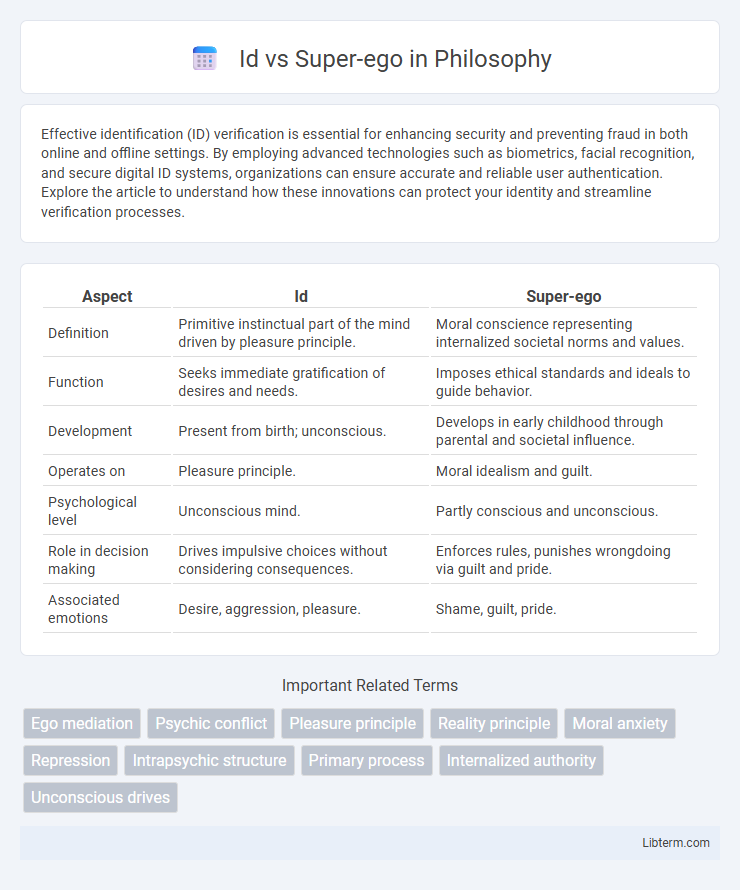Effective identification (ID) verification is essential for enhancing security and preventing fraud in both online and offline settings. By employing advanced technologies such as biometrics, facial recognition, and secure digital ID systems, organizations can ensure accurate and reliable user authentication. Explore the article to understand how these innovations can protect your identity and streamline verification processes.
Table of Comparison
| Aspect | Id | Super-ego |
|---|---|---|
| Definition | Primitive instinctual part of the mind driven by pleasure principle. | Moral conscience representing internalized societal norms and values. |
| Function | Seeks immediate gratification of desires and needs. | Imposes ethical standards and ideals to guide behavior. |
| Development | Present from birth; unconscious. | Develops in early childhood through parental and societal influence. |
| Operates on | Pleasure principle. | Moral idealism and guilt. |
| Psychological level | Unconscious mind. | Partly conscious and unconscious. |
| Role in decision making | Drives impulsive choices without considering consequences. | Enforces rules, punishes wrongdoing via guilt and pride. |
| Associated emotions | Desire, aggression, pleasure. | Shame, guilt, pride. |
Understanding the Id: The Primitive Core
The Id represents the primitive core of human personality, operating entirely on the pleasure principle and driven by unconscious instincts and desires for immediate gratification. It encompasses basic biological urges such as hunger, thirst, and sexual impulses, forming the foundation upon which the ego and superego are built. Understanding the Id is crucial for exploring human motivation, as it reveals the raw, unfiltered needs that influence behavior beneath conscious awareness.
The Super-ego: Society’s Moral Compass
The super-ego functions as society's moral compass, internalizing cultural norms, values, and ethical standards to regulate behavior. It imposes guilt and strives for perfection by opposing the impulsive desires driven by the id. By balancing primal urges with social expectations, the super-ego enforces conformity and guides individuals toward socially acceptable conduct.
Origins of the Id and Super-ego in Freud’s Theory
Freud's theory posits the id as the primal component of personality, emerging from innate biological drives present at birth, which operates on the pleasure principle seeking immediate gratification. The super-ego originates later through the internalization of societal norms and parental authority during early childhood development, functioning as the moral conscience that monitors and restricts the id's impulses. These structures interact dynamically within the psyche, balancing instinctual desires with ethical standards to shape behavior.
Key Differences Between Id and Super-ego
The Id operates on the pleasure principle, seeking immediate gratification of basic instincts and desires, while the Super-ego functions on the morality principle, enforcing ethical standards and societal rules. The Id is unconscious and impulsive, driven by primal urges, whereas the Super-ego is partly conscious and internalizes parental and cultural values to control the Id's impulses. Key differences include the Id's focus on instinctual needs versus the Super-ego's role in judgment and guilt, creating a dynamic tension within the human psyche.
The Role of the Id in Human Behavior
The id operates as the primal part of the human psyche, driving instinctual desires and seeking immediate gratification of basic urges such as hunger, thirst, and sexual impulses. It functions on the pleasure principle, demanding satisfaction without considering consequences or social norms, thus influencing behaviors that are impulsive and unconscious. This foundational psychic energy is critical in motivating survival-driven actions and forms the basis from which the ego and superego develop and mediate behavior.
How the Super-ego Shapes Decision-Making
The Super-ego influences decision-making by enforcing internalized moral standards and societal norms, acting as a critical guide between instinctual desires and ethical behavior. It evaluates choices based on ideals and the need for approval, often inducing feelings of guilt or pride that steer actions toward socially acceptable outcomes. This psychological mechanism balances the impulsive demands of the Id with reality, strengthening restraint and promoting responsible decisions aligned with cultural values.
Id vs Super-ego: Sources of Inner Conflict
The Id represents primal urges driven by the pleasure principle, seeking immediate gratification without regard for consequences, while the Super-ego embodies internalized moral standards and societal rules aiming for perfection and control. Conflict arises when the impulsive desires of the Id clash with the rigid restrictions of the Super-ego, creating tension within the psyche. This inner struggle between instinctual drives and ethical constraints is a central source of psychological conflict and anxiety.
Balancing Instincts and Morality
The Id drives primal instincts and unconscious desires, demanding immediate gratification, while the Super-ego embodies moral standards and societal rules, enforcing restraint and ethical behavior. Balancing these conflicting forces is crucial for psychological health, enabling individuals to satisfy instinctual needs without violating internalized moral codes. Effective negotiation between the Id and Super-ego promotes adaptive decision-making and emotional stability.
Id and Super-ego in Everyday Life
The id drives impulsive behaviors by seeking immediate gratification of basic desires such as hunger, thirst, and pleasure, often influencing spontaneous decisions in everyday situations. The super-ego, representing internalized moral standards and societal rules, acts as a conscience that guides individuals to choose ethical actions and resist temptations. The dynamic tension between the id and super-ego shapes daily behavior, balancing primal urges with social expectations to maintain psychological equilibrium.
Psychological Implications of Id-Super-ego Dynamics
The dynamic interplay between the id and super-ego significantly influences human behavior and psychological development. The id, driven by primal desires and unconscious impulses, often conflicts with the super-ego, which embodies internalized moral standards and societal rules. This tension shapes decision-making processes, emotional regulation, and personality formation, with imbalances potentially leading to anxiety, guilt, or neurotic behaviors.
Id Infographic

 libterm.com
libterm.com